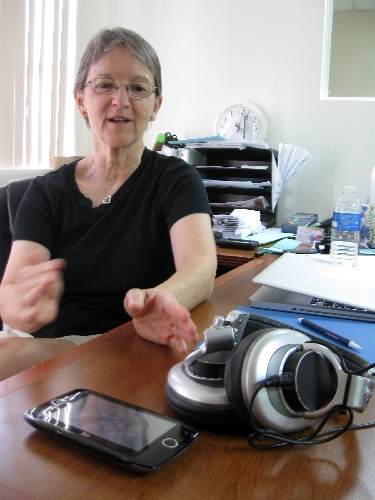Teacher uses listening technology to reach struggling students

When a child has attention problems and is doing poorly in school, many times, their hearing is checked.
And many times, it checks out just fine.
Brain Solutions Inc., 8515 Edna Ave., Suite 160, is an option that offers scientifically designed programs that aim to improve attention deficit hyperactivity disorder, anxiety, learning issues, auditory processing and sensory integration.
It involves how one’s brain processes auditory information.
"Some people think it’s a listening problem, but that’s not correct," said Kirsten Lopez, founder and director of Brain Solutions Inc. "I could listen to you speak Chinese, but I wouldn’t understand you."
Heidi, who asked that her last name not be used, was aware that her 10-year-old son, Brady, was having a hard time in school. It could take three hours to complete his math homework. He was tested for a number of conditions, and his hearing was checked.
After undergoing the Tomatis method, or Audio-Psycho-Phonology, Brady is now "calmer, has better peer interactions, his homework is done quickly without a lot of prompting or reminding," Heidi said. "He responds to people when they talk to him in a crowd. This was a major improvement because people viewed him as rude and snotty because they would talk to him but he couldn’t tell who was talking and tuned everything out … (now) he is a much more positive child."
Lopez, a resource coordinator and special education teacher at Faith Lutheran Jr/Sr High School, 2015 S. Hualapai Way, started using the Tomatis method after learning about it five years ago. Initially, the 50-year-old program used a computer as large as a desk, and the software was anything but user-friendly. Add to that the cost of flying to Paris for six weeks of training, and it wasn’t plausible to bring it to Las Vegas.
Then about four years ago, the technology was revamped. The computer now fits in the palm of one’s hand. The software is easy to learn and navigate.
The method is credited to Albert Tomatis, a nose, ear and throat doctor in France whose father was an opera singer. As those singers’ voices changed as they aged, they approached Tomatis asking for help in regaining their voices.
"Back then, they did Draconian things like spraying strychnine on their vocal chords, and all kinds of horrible things, to keep these people singing," Lopez said. "As it turned out, it wasn’t their voices that were aging, it was their listening that was aging … he realized you can’t sing what you can’t hear."
It works by using headphones that sit atop the skull for bone conduction of sound, which makes up 10 percent of how we hear. The person listens to classical music and Gregorian chants that have been modulated. The music will switch between ears. It will pause almost imperceptibly at varying times and emphasize higher sounds at times, then the lower pitches.
The program requires 15 two-hour-a-day sessions done over three weeks. During those two hours, the headsets are streaming music through them as clients stay occupied. They can play games, draw, read or do homework. After a three- or four-week break, they return for a second set of sessions.
No medications are involved.
For many, the 60 hours of listening is all they need to reset the way their brain processes auditory information. The cost is $3,400 and is usually not covered by insurance.
While many in the program are children, adults also are clients. Paula White went through the program to address anxiety. She was soon sleeping better and is not as anxious as before. She said she is so empowered that she embarked on a graduate degree.
"People should be open-minded about this program," she said. "It does sound a little like voodoo magic at first and a little too good to be true, but anyone who’s out there struggling or their children are struggling … this is a great tool to help get them to … untangle the wires."
Besides the Tomatis method, the center offers cognitive retraining, social skills classes, Irlen testing and educational consulting. For more information, visit brainsolutionsnv.com.
Contact Summerlin/Summerlin South View reporter Jan Hogan at jhogan@viewnews.com or 387-2949.












